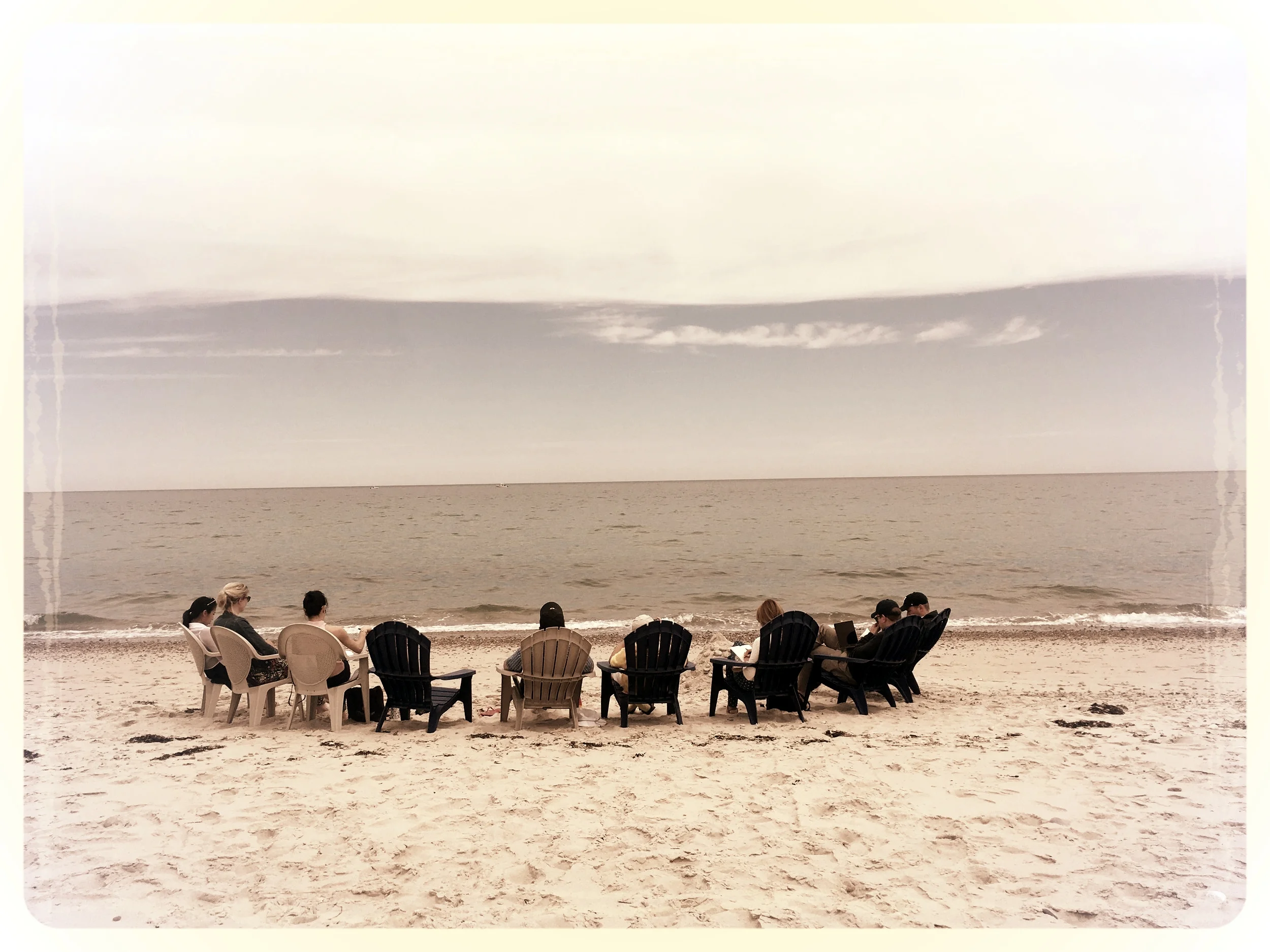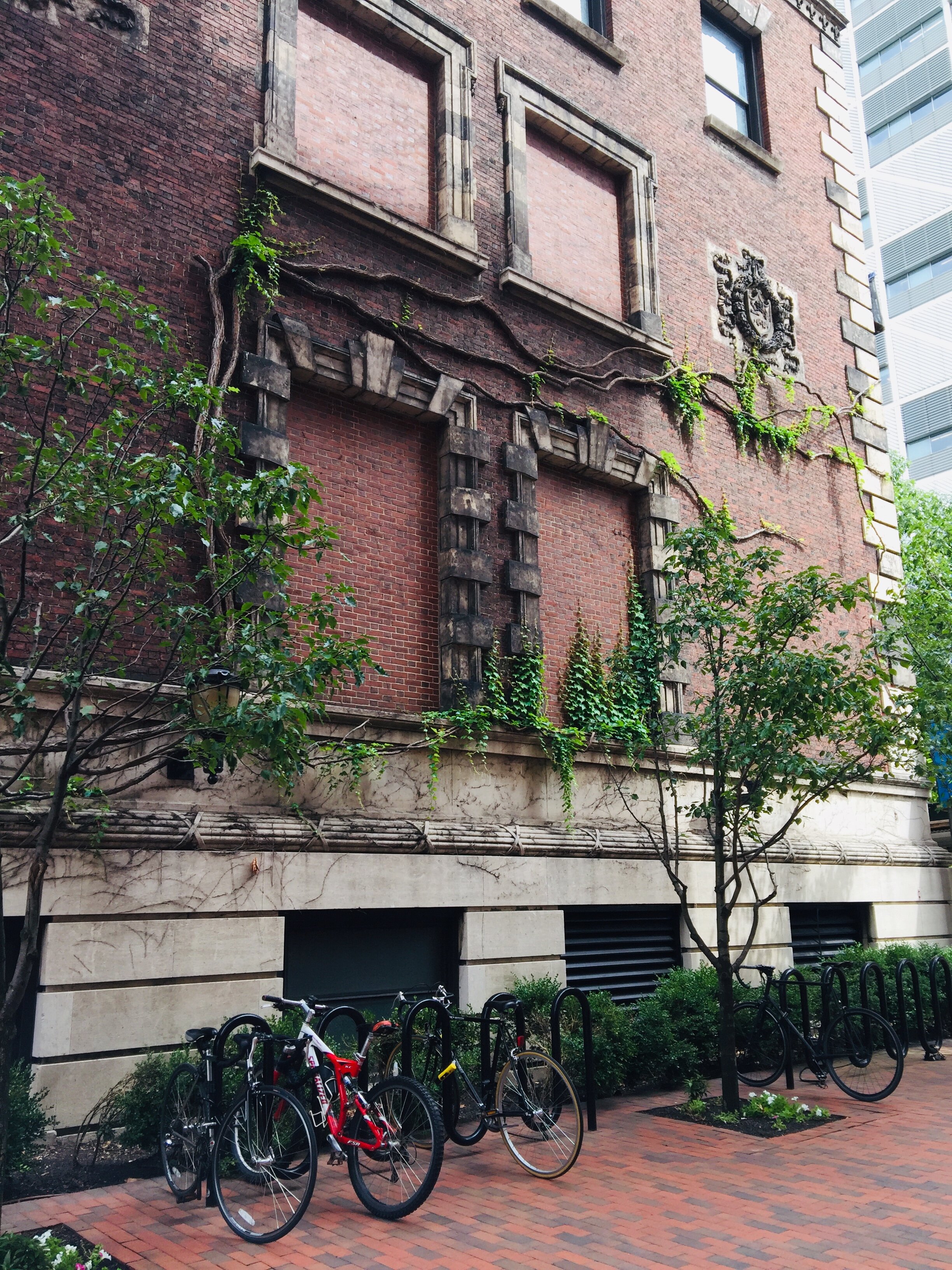This Thanksgiving, I want to take a moment to give thanks to the many educators who have positively shaped my thinking, learning, and teaching at various stages of my life. I would not have had the courage or the motivation to pursue a profession in education, were it not for my own teachers. They ignited in me a love of learning and cultivated the right environment for me to experience growth (which was not without frustrations and hardships). Thus, I devote this essay—one that I wrote at the start of this academic year as part of a philosophy of education course—to my teachers and to my colleagues who are teachers.
I want to give an extra special thanks to the following people: Mom and Dad for serving as my first and lifelong teachers through the good and the bad times in my life; Mrs. Whittaker (I never did learn your first name) for your patience and care in teaching me English when I moved to the U.S. at age 9 and helping me earn a “6” (out of 6) on the state writing test in 4th grade; Stephanie Bertenshaw, Dawn DeMeo, and the late Megumi Yamamoto for your kindness, guidance, and wisdom—which helped me cope and reflect on what was perhaps the most difficult stage of my life (i.e., high school); Kimberly O’Donnell, Didem Vardar-Ulu, and Ken Hawes for the varied opportunities that you made possible for me in the field of education through not only your letters of recommendation but also your belief in me through my five (!) years at Wellesley; Julie McTague and JT Schemm for your caring, loving, and inspiring mentorship through my first five years of teaching high school science (I continue to look up to you both!); and Nancy Lesko, Haeny Yoon, and Celia Oyler for your formal and informal advisement during the foundational years of my doctoral studies. What an education I've had in the these 29 years (as of 2019)!
One of the many cafes I pass by when I walk to Teachers College. This one is on the Upper West Side.
Teacher as Learner, Guide, and Caregiver:
Moving from Teaching as a Profession to a Holistic View of Teaching
Catherine Y. Cheng Stahl
Teachers College, Columbia University
There are few moments in Plato’s writings when Socrates is not portrayed as a complex, often ambiguous figure. For one, Socrates rarely explicitly states what something is or is not, without first engaging in discourse. He also seldom arrives at or helps another reach a definite answer. It is against this backdrop that I find this statement most striking: “I have never been anyone’s teacher…I never promised to teach…anything and have not done so” (p. 37, 33a-b). By explicitly stating that he is not a teacher, Socrates destabilizes our understanding of who a teacher is. His proclamation jolts us into a state of puzzlement and intrigue, for in many ways he exemplifies the values and demonstrates the actions we associate with good teaching.
It is precisely the lack of ambiguity in his statement that forced me to take pause and ask myself, “Socrates is a teacher, is he not?” On the surface, this question appears to be quite straightforward. It even resembles many of the guiding questions Socrates asks his interlocutors to inquire about piety, love, virtue, and immortality. Upon closer examination, however, I realize that the question is actually deceptively simple. In pondering this question, I find myself asking a series of questions—many of which invite me to recollect my own experiences as a teacher, to revisit memories of my fondest teachers, and to reconsider who a teacher is.
Thus, I see this essay as an opportunity to reevaluate my understandings of what makes someone a teacher. I draw inspiration from Anna Gibbs (2015), who writes that writing is “a mode of inquiry in its own right” (p. 222). Recognizing writing as “a process, implicitly dialogical, in conversation with the world, with other writing, and, reflexively, with itself” (Gibbs, 2015, p. 224), I employ writing as a way to gain entry into and to get in touch with my own thinking surrounding teaching, learning, and the pursuit of an education. In responding to the question, “Is Socrates a teacher?” I wish to pose three of my own: First, might a teacher be a learner? Second, is a teacher also a guide? Finally, should a teacher be a caregiver?
One of my favorite buildings to pass by on the Barnard College campus—I love watching the leaves change colors across the seasons.
I begin by pondering whether a teacher is simultaneously a learner. In Plato’s dialogues, Socrates exhibits a deep love of learning—a kind of life-long learning that underscores inquiry as an art of living. This is exemplified by a prominent line: “As it is, the lover of inquiry must follow his beloved wherever it may lead him.” (p. 18, 14c). This “wherever” that he speaks of refers to what “you do not know at present…that you should always confidently seek out” (p. 78, 86b). What Socrates provides his interlocutors is perhaps best characterized as an approach to experiencing the world through sustained investigation. At its core, this art of living entails boldly embracing the unknown, accompanied by a willingness—and a curiosity—to engage in discourse, not to arrive at a single understanding but to approach deeper understanding. With this art comes an eagerness to trouble seemingly fixed categories, to interrogate rules, and to question the way things are. Indeed, it is through inquiry with others that Socrates shows how “arguments seem to move about instead of staying put” (p. 19, 15b).
Just as arguments can shift, so, too, can people’s way of thinking. What I find especially admirable about Socrates is his self-effacing nature. Despite his wisdom, he does not claim to know more than others. Quite the contrary, he reminds us that “I myself do not have the answer when I perplex others” (p. 70, 80c-d) and that “the need for education applies to me as well as to you [Alcibiades]—we’re in the same condition” (p. 581, 124c). Here, we see the traditional roles of teacher and learner challenged. Socrates, I would argue, is more of a teacher-learner in that he approaches each conversation with a readiness to learn while assuming that his interlocutors have valuable knowledge to contribute. For example, to “learn from you the nature of the pious and the impious” (p. 20, 15e) is precisely the reason Socrates seeks out Euthyphro after having been accused of impiety. Ironically, in that dialogue, it is Euthyphro who eventually learns through Socrates’ questioning that he has more to learn about piety himself. Unlike Socrates, however, he is not of the opinion that “I can make other people’s things move as well as my own” (p. 14, 11d). Instead of confronting his apparent ignorance regarding piety and welcoming the possibility of transformation, Euthyphro leaves Socrates to press on with the inquiry by himself.
This is not the main entry to the Columbia University campus, but it is my personal favorite gate to pass by.
By viewing teachers as learners, I begin to understand why Socrates might have wanted to distance himself from the Sophists—the “professional teachers” who are regularly referenced. Socrates as a teacher-learner stands in stark contrast to those who charge a fee for “mak[ing] people clever speakers” (p. 87, 95c). Teaching, in this light, is highly transactional; in exchange for payment, the Sophists instruct young men in the art of rhetoric, so that they may gain power and fame through the sound of their voices and the impact of their words. Whereas the Sophists ask for payment, Socrates readily shares what he thinks, “not only without charging a fee but even glad to reward anyone who is willing to listen” (p. 4, 3d). In this way, Socrates’ conception of teaching can be seen as devoted service.
On this mention of service, I wish to transition to my second question and to think through the concept of teacher-as-guide. I begin by referring to a quote in a later dialogue: “I believe myself to be a fellow servant…dedicated to the same god” (p. 123, 85b). This quote reveals teaching as a humble service that one commits to, with body and soul, rather than as a financial transaction that exploits the vulnerability and greed of young men. Unlike the Sophists, Socrates goes great lengths to engage interlocutors in discourse, hoping to initiate them into a community of learners committed to attaining an education through active, dialogic participation. As an enduring member in this community, he serves the role of a teacher-guide (per Dr. Avi Mintz), who guides learners to experience—emotionally, cognitively, and physically—their recollection of knowledge. This is most evident in “Phaedo,” in which Socrates shares his final moments of life with his pupils, working through the question of a soul’s immortality.
This concept of teacher-as-guide also surfaces when Socrates involves a slave boy in discussing geometry—a topic the boy believes he has little knowledge of—and encourages him to “answer what you think” (p. 74, 83d). Here, Socrates assumes competence, working from the premise that each person (including a slave) has knowledge that can be recollected with good questioning. The role of a teacher, then, is “not teach him…and explain things to him” in the sophist sense, but “do nothing more than ask questions…and he will come out of his perplexity while searching along” (p. 75, 84c-d) with the teacher. Taken together, a teacher is someone who helps an individual realize what he does not yet know and to guide him in finding a path around the unknown without “think[ing] himself at a loss” (p. 75, 74b). In this way, a teacher-as-guide has the duty to provide an environment to support learners in taking an active role in their own education. It is in this environment where teacher and learners can engage in collective aporia with care.
Being a full-time student grants me the privilege to combine work with leisure, which to me means spending time in coffee shops/cafes reading, writing, and thinking. This is Edgar’s Cafe on the Upper West Side.
It is with this notion of care that I wish to consider my final question: Are teachers also caregivers? In thinking about caring, I gravitate toward a line in which Socrates says, “I was always concerned with you…like a father or an elder brother” (p. 35, 31b). The concern that Socrates shows those in his community rivals that for his own family. This concern for others also manifests itself in Socrates’ pedagogical sensitivity—a characteristic that allows him to better engage his interlocutors and help them through aporetic moments to cultivate self-knowledge and gain self-awareness. It is his sensitivity that earns him the admiration of his pupils. In the process of trying to prove the existence of the soul after death, Phaedo, Simmias, and Cebes find themselves in a state of confusion, doubt, and uncertainty. As a compassionate figure displaying acute sensitivity, Socrates was not only “aware of the effect the discussion had” on the young men, but also responded in a “pleasant, kind, and admiring way” that “healed [their] distress…recalled [them] from [their] flight and defeat and turned [them] to join him in the examination of their argument” (p. 126, 89a). With this heartwarming scene, we are reminded of the need for teachers to attune to the affective dimensions of teaching and to attend to the emotional needs of students. In his final moments of life, Socrates says to his students, “tak[e] good care of your own selves in whatever you do…if you neglect your own selves…you will achieve nothing” (p. 151, 115b-c). Once more, we hear from Socrates that exercising self-care is at the heart of educating oneself—a process one must take up in his own way.
All my thinking thus far, while inspiring new lines of flight, has also helped to sediment one idea, which is that who a teacher is is one worth interrogating further through sustained inquiry. Engaging in this idea through my writing has led me to wonder more about the goals and curricula of teacher education programs and whether they embrace the kind of inquiry, mentorship, and care that Socrates cultivates. In particular, I wonder how Socrates would evaluate the readiness of a prospective teacher to teach. I lay out my emergent thinking surrounding the “Socratic teacher” in the remaining section of this essay.
This coffee shop is like an indoor greenhouse, complete with espresso drinks. This is the Plantshed Cafe on the Upper West Side.
To begin, Socratic teachers admit openly that they do not have all the answers and embrace the statement, “I shall never fear or avoid things of which I do not know,” (p. 33, 29c). In other words, teachers should not see themselves as all-knowing Sophists, who pass on discrete packets of knowledge to students as if depositing money into an empty bank account. This way of teaching—if it can be called teaching at all—allows for little openness, even less creativity to explore one’s own thinking, and no space for working through aporetic experiences. It is doubtful whether students truly learn to appreciate and value their education, for this method demands little of their active participation in cultivating their soul. To this “banking model” of instruction, Socrates would likely caution that there is little value, for where is the perplexity and self-discovery? Where is the transformation, for both the teacher and the learner?
Furthermore, Socratic teachers recognize that learners are in need of guidance, not punishment. When students misbehave, teachers will assume that they did not act this way deliberately. According to Socrates, teachers shall “get hold of them privately, to instruct them and exhort them” and not “bring people to court for such unwilling wrongdoings” (p. 30, 26a)—that is, Socratic teachers take a restorative justice approach to misconduct. Likewise, when students struggle, Socratic teachers will assume they are capable of growth and transformation and will create environments for them to wrestle with ideas and persist through inquiry.
My go-to local coffee shop is Stella & Fly, where I have produced paper after paper. I imagine this is where I’ll be camping out post-Thanksgiving break, simultaneously writing five papers.
In the same vein, Socratic teachers regard teaching as entangled with caring for the whole individual—body and mind. They teach others to love learning through engaging in inquiry. They encourage students to question everything and everyone, including them, and to make sense of learning in their own way. In elaborating on this point, I foreground a quote from “Alcibiades,” in which Socrates says, “You can question me, if you like, as I questioned you—or else work it out yourself, in your own argument” (p. 570, 114b). Beyond developing cognitive abilities, Socratic teachers regard teaching as imbued with emotional labor and approach their students with acute sensitivity and care. In difficult times, they adopt the attitude to be “nevertheless willing to do my best for your sake” (p. 72, 82b).
In sum, in this essay, I have attempted to depict a good teacher as one who embodies teacher-as-learner, teacher-as-guide, and teacher-as-caregiver—three points for a stable foundation underlying both pedagogy and psychagogia. As someone who epitomizes all three, Socrates, I argue, is indeed a teacher.
“Sometimes you meet people who change your life for the better” says the little blue card. I’d say this is true for all the educators in my life. Thank you!
References
Gibbs, A. (2015). Writing as method: Attunement, resonance, and rhythm. In B. Timm Knudsen & C. Stage (Eds.), Affective methodologies: Developing cultural research strategies for the study of affect (pp. 222–236). Basingstoke, Hampshire: Palgrave Macmillan.
Plato. (2002). Five dialogues (2nd ed.; G. M. A. Grube, Trans.). Indianapolis, IN: Hackett Publishing Company, Inc.







